Apr 2022 1st edition
Apr 2022 1st edition Londekile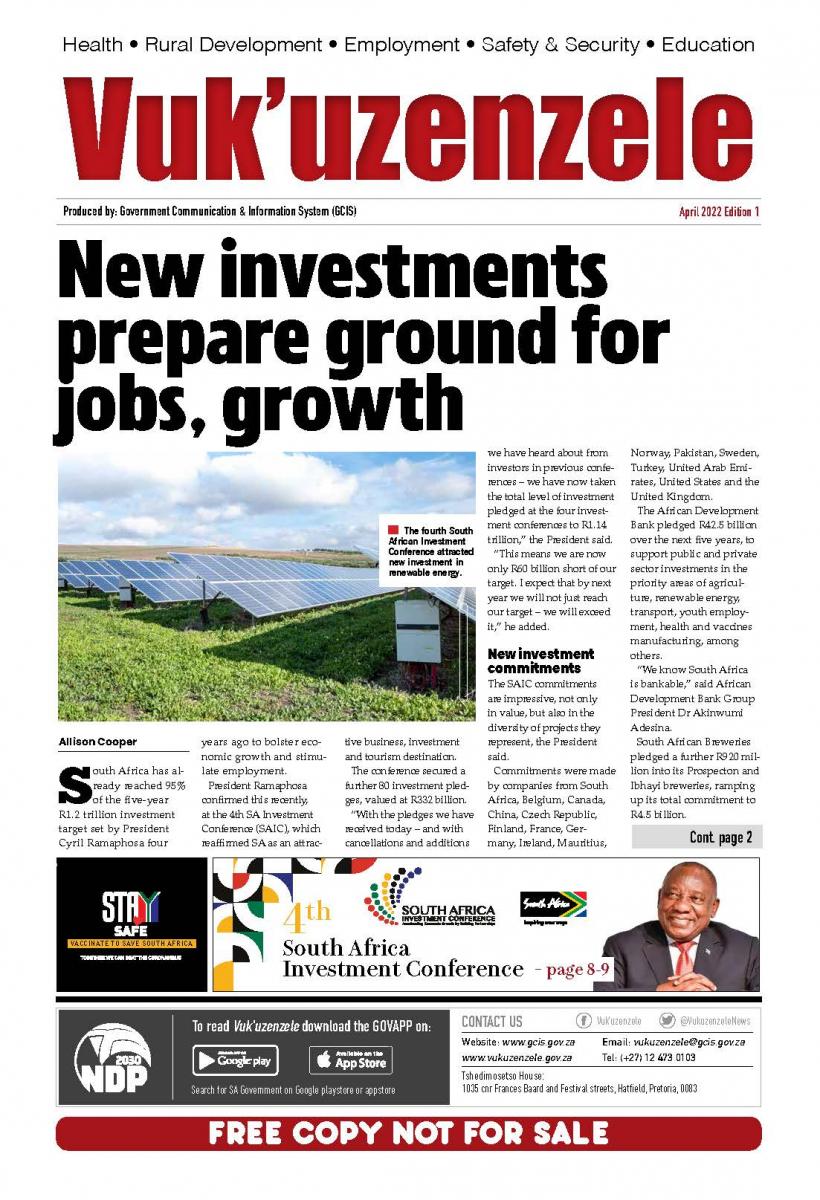
English PDF version
Translations
Afrikaans
isiNdebele
isiXhosa
isiZulu
Sepedi
Sesotho
Setswana
Siswati
Tshivenda
Xitsonga
Adjusted Alert Level 1 restrictions
Adjusted Alert Level 1 restrictions vuyelwanPresident Cyril Ramaphosa has announced the easing of several restrictions as part of Adjusted Alert Level 1.
Addressing the nation on developments in the country’s response to the COVID-19 pandemic recently, President Ramaphosa said the approach going forward is that both indoor and outdoor venues can now take up to 50% of their capacity provided that the criteria for entrance are proof of vaccination or a COVID-19 test not older than 72 hours.
The President said following consultations and the recommendations of the National Coronavirus Command Council, Cabinet has decided to ease restrictions on gatherings and previous regulations.
He said the emphasis was on placing an upper limit on the number of people who could attend a gathering.
“But where there is no provision for proof of vaccination or a COVID-19 test, then the current upper limit will remain – of 1 000 people indoors and 2 000 people outdoors,” the President said.
Changes to the restrictions would benefit the sporting, cultural, entertainment and events industries.
The maximum number of people permitted at a funeral will increase from 100 to 200.
Wearing of masks
The President also announced important changes to the regulation on the wearing of masks.
As before, it is mandatory to wear a cloth mask or similar covering over the nose and mouth when in public indoor spaces. 
However, a mask is not required when outdoors.
“This means that we still need to wear masks when in shops, malls, offices, factories, taxis, buses, trains or any other indoor public space.
“But we do not need to wear masks when walking on the street or in an open space, when exercising outdoors or when attending an outdoor gathering,” President Ramaphosa said.
The regulations on social distancing have been changed, requiring that a space of 1 metre is maintained between persons in all settings, except schools.
Vaccinations
Going forward, the President said the most important defences against the disease are, firstly, vaccination and, secondly, the observance of basic measures, such as wearing masks indoors.
“Statistics from our health facilities, clearly show that people who are not vaccinated stand a higher chance of being hospitalised or dying from COVID-19,” the President said.
The President further encouraged those who are vaccinated to go and receive their booster doses.
Have your say on National State of Disaster
“Due to the changing nature of the pandemic, and due to the progress that has been made through our collective efforts, we intend to lift the National State of Disaster as soon as public comment on the health regulations published by the Minister of health has been completed.”
These regulations, when finalised, will replace the State of Disaster regulations as the legal instrument that government uses to manage the pandemic.
The President however emphasised that what should be clear is that the end of the National State of Disaster does not mean the end of the pandemic.– SAnews.gov.za
All you need to know about epilepsy
All you need to know about epilepsy LondekileAccording to Dr Nhlakanipho Gumede, the Clinical Manager of Medical Services at Harry Gwala Regional Hospital in Pietermaritzburg, epilepsy is not a psychological disorder, disease or illness, and it is not contagious.
He explains that epilepsy is a neurological disorder marked by sudden recurrent episodes of sensory disturbance, loss of consciousness or convulsions, associated with abnormal electrical activity in the brain.
“The brain comprises of billions of nerve cells (neurons) communicating through electrical and chemical signals. When there is a sudden excessive electrical discharge that disrupts the normal activity of the nerve cells, a seizure may result.
“A single seizure does not necessarily mean you have epilepsy. A diagnosis by a medical practitioner needs to confirm this,” he says.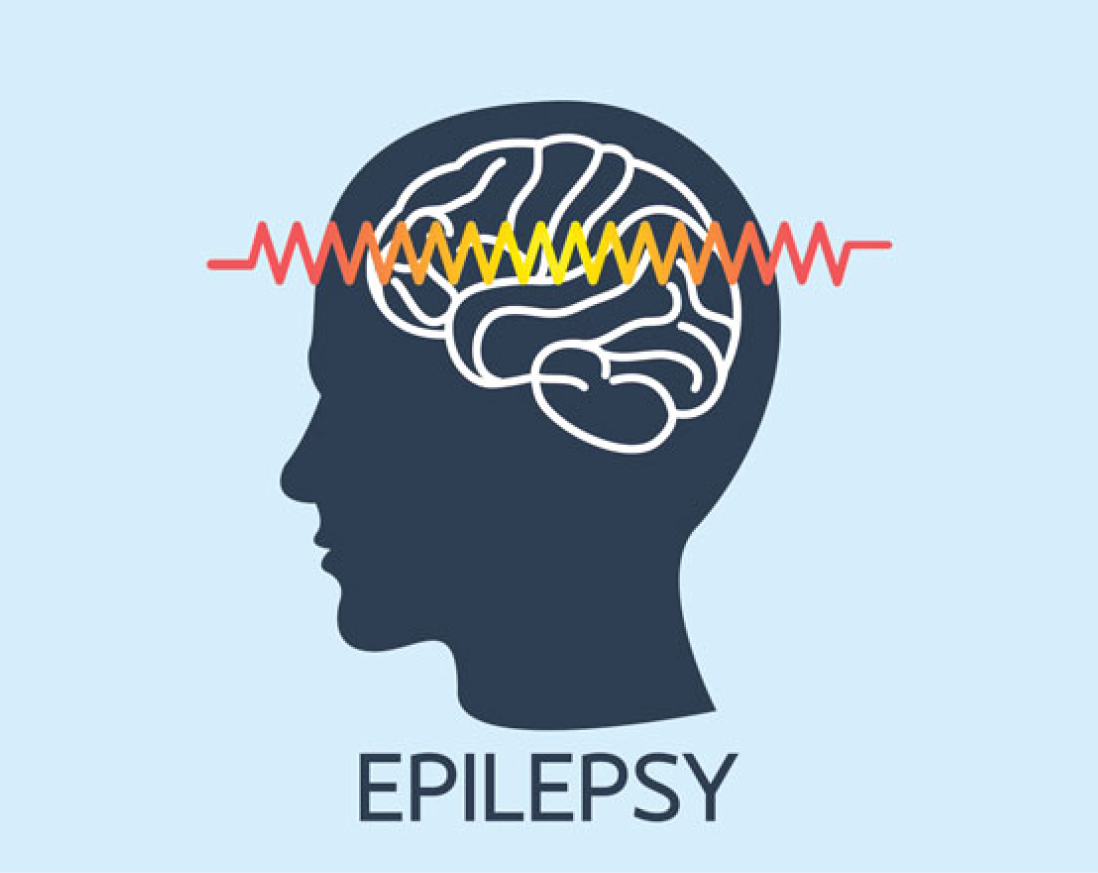
According to Epilepsy South Africa, 80% of people with epilepsy will be able to control their seizures with medication.
Causes and seizures
The cause of epilepsy in six out of 10 people is not known. In the other 40%, it can be caused by a head injury, injury during the birthing process, alcohol and drug abuse, aging or a metabolic or biochemical disturbance or imbalance.
Dr Gumede says the signs and symptoms of epilepsy vary, and can present in various ways, including generalised absence seizures (petit mal), when a person looks blank and stares; generalised tonic-clonic seizures (grand mal), which commonly start with body stiffening, before the person falls down and has jerking movements; and complex partial seizures, which affect a part of the brain.
A petit mal seizure only lasts a few seconds, and the person may be unaware that they had one. During a grand mal seizure, the person may have a blue colour around their mouth, which fades when normal breathing resumes. Grand mal seizures usually last a few minutes.
“Protect the person from injury by moving objects away and cushioning their head. Don’t restrict their movement or put anything in their mouth. Help breathing by laying the person on their side when the seizure ends. Stay with the person until they have fully recovered.”
During a complex partial seizure, the person may appear confused, distracted or drunk. They may also have repetitive movements, such as plucking at their clothes. “Remove harmful objects and guide the person away from danger. Talk quietly and reassure them,” says Dr Gumede.
* Information supplied by the KwaZulu-Natal Department of Health.
For more information about epilepsy, visit Epilepsy SA’s website at https://epilepsy.org.za, or visit your closest healthcare facility for assistance.
Baker rises to success
Baker rises to success UrsulaAn idea to sell bread and confectionery in her community, and the courage to test the market, turned business analyst Nhlamulo Mnisi (34) into a successful entrepreneur. 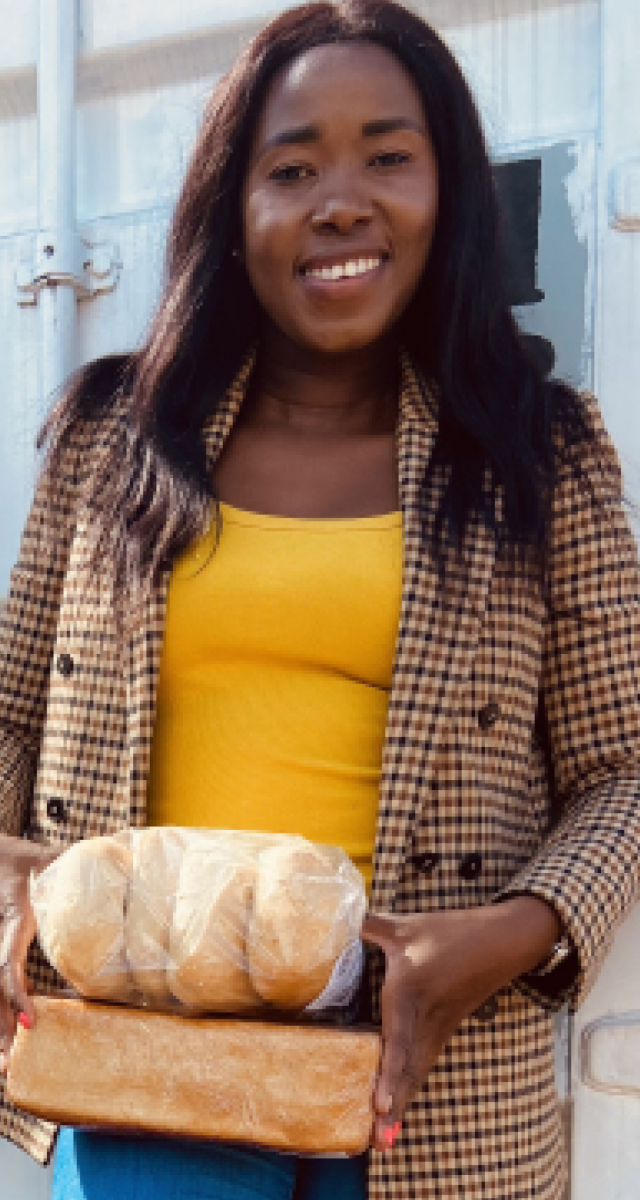
One day at home in Mphakani Village, in Dzumeri, Giyani, Limpopo, Mnisi noticed an Albany bakery truck delivering bread.
“On investigating, I realised there was a need to produce fresh bread, at an affordable price, suitable for the community that raised me. The response was phenomenal. I never imagined I could produce something that people would buy.
“When my product was well received by customers and the community, it was clear that I needed to expand production and buy more equipment,” says Mnisi, who always dreamt of opening her own business.
She opened King’s Bakery in the heart of Dzumeri in October 2019.
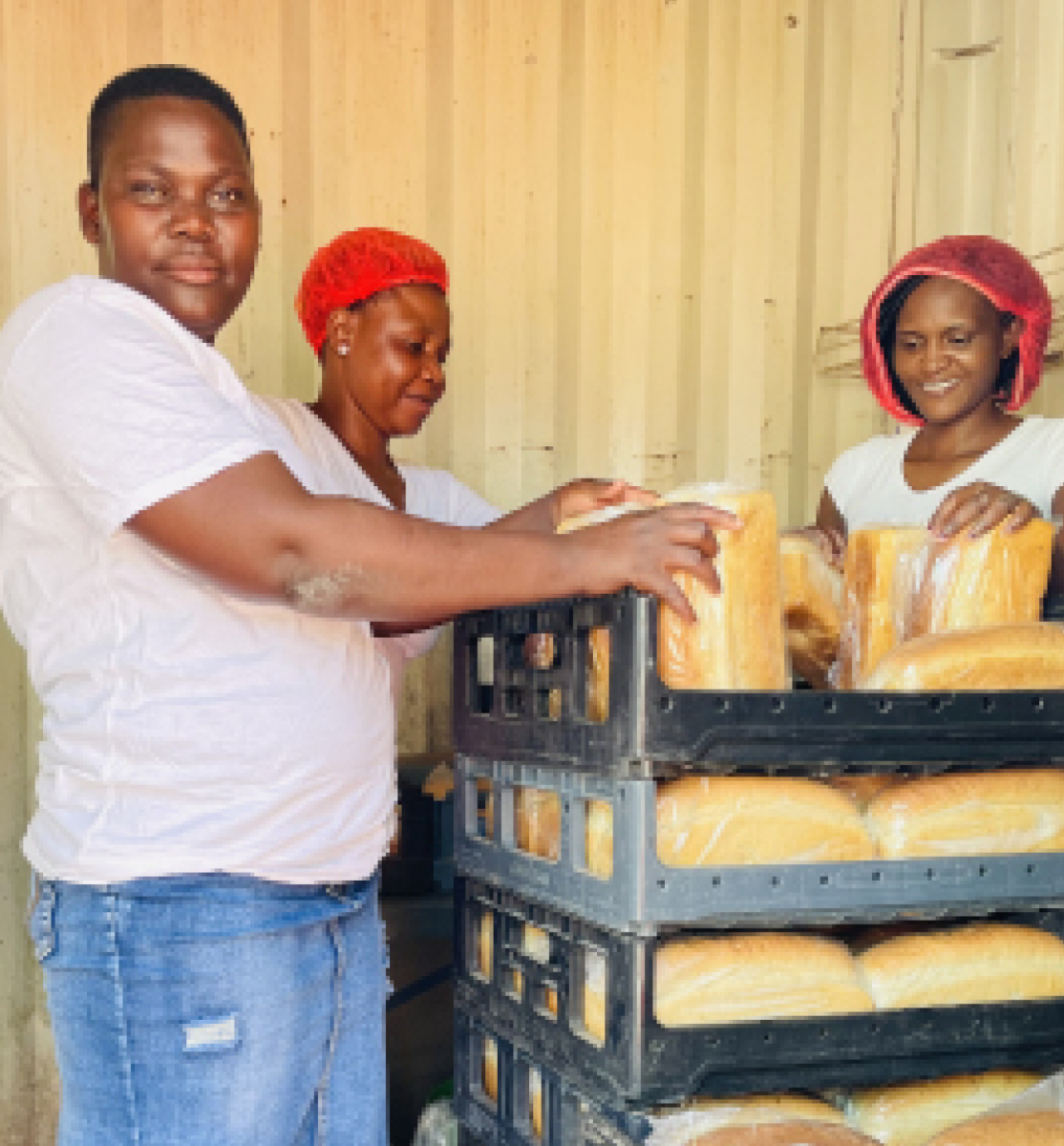 “The bakery is ideally located for customers commuting to work, school and town. We produce freshly made white, brown and yellow bread, and confectionery, including fat cakes, scones and biscuits.
“The bakery is ideally located for customers commuting to work, school and town. We produce freshly made white, brown and yellow bread, and confectionery, including fat cakes, scones and biscuits.
“We are the only bakery around, which gives us the advantage of being early and getting local support,” she says.
Mnisi self-funded her start-up bakery. “I maxed my savings and credit cards to buy second-hand equipment and a delivery vehicle. I bought a fully functional bakery, built inside a shipping container.”
While still operating from the shipping container, the bakery is moving to bigger premises.
“Our business is growing and the container cannot accommodate more equipment,” Mnisi explains.
Dzumeri has 18 villages and about 300 shops. “I went door-to-door to every shop and quickly realised I was only accessing 10% of the market,” says Mnisi, explaining that funding was her biggest challenge.
“I spoke to business people and heard about government programmes that assist small businesses… I searched for funding agencies and came across the National Youth Development Agency (NYDA),” she says.
After completing the NYDA’s week-long business management training course, she was able to apply for funding.
“After a site inspection, I received a R100 000 grant. I used 50% to purchase stock, such as flour and the other ingredients for producing bread; and 50% to buy equipment, including a moulding and cutting machine for our confectionary products.
“The money was paid directly to my suppliers. This is a perfect strategy, as money goes into the growing the business,” says Mnisi.
The bakery, which now employs five people, supplies 30 shops with an average of 40 to 60 loaves daily.
“The plan is to reach all 300 shops in the coming year. We also offer catering for functions and events, and have started to reach out to hospitals, schools and correction centres. I also plan to open coffee shops in nearby towns, where we will sell our goods,” says Mnisi.
Before opening the bakery, Mnisi was a business analyst. Backed by a BCom in Economics and Econometrics from the University of Johannesburg, she encourages entrepreneurs to start small.
“Starting small was beneficial for me. I learnt the fundamentals of business, didn’t drown or give up, and learnt to manage, adapt and grow,” she says.
For more information about NYDA funding, visit www.nyda.gov.za or call 087 158 6345 / 5738.
Digitally connecting South Africa
Digitally connecting South Africa LondekileImproved connectivity in underserviced areas will enable better health, education and internet services to communities that need them the most.
Government’s SA Connect project aims to achieve 80% broadband access in communities and government facilities over the next three years.
In January 2022, Cabinet approved the roll-out of SA Connect phase two, which forms part of government’s commitment to bridge the digital divide, especially in rural communities, and to advance the digital economy.
According to the Department of Communications and Digital Technologies, due to the magnitude of SA Connect, the project plan was divided into two phases.
Phase one initially aimed to connect 6 135 government facilities, including schools, health facilities, post offices, police stations and government offices, in the eight rural district municipalities.
Phase one’s scope was subsequently reduced due to the economic impact of the COVID-19 pandemic.
“It served as a pilot phase to provide broadband services to about 970 critical government facilities,” Cabinet said.
These facilities included 597 schools, 115 health facilities and 258 government department facilities in eight district municipalities, namely Dr Kenneth Kaunda (North West), Thabo Mofutsanyane (Free State), OR Tambo (Eastern Cape), Vhembe (Limpopo), Gert Sibande (Mpumalanga), Pixley ka Seme (Northern Cape), uMgungundlovu and uMzinyathi (KwaZulu-Natal).
According to the department, phase two aims to connect in excess of 42 000 government facilities countrywide.
Cabinet also stated that the SA Connect phase two will be rolled-out using three state-owned entities – the State Information Technology Agency, Broadband Infraco and Sentech – and industry, over the next 36 months.
In November last year, the Minister Communications and Digital Technologies, Khumbudzo Ntshavheni said the COVID-19 pandemic has demonstrated the extent of the digital divide in South Africa and the rest of the developing world, particularly on the African continent.
“The divide has been evident during this period, between those with access to connectivity and those without; as basic services such as access to education, health, work and the ability to continue to operate one’s business in the event of small businesses or small, medium and micro enterprises moved to virtual platforms.”
She noted that in South Africa children from schools and families with access to the internet were able to continue with their learning with minimal interruption.
“Whereas the majority who did not enjoy similar access have suffered huge losses in school days thus impacting on their access to quality education.
“Therefore, for us, access to the internet or connectivity, or bridging the digital divide, has become a first and foremost priority for our country,” she added.
SA Connect phase two will go a long way in bridging that divide.
Get your grant and test for hypertension
Get your grant and test for hypertension LondekileQueueing pension grant recipients in Bushbuckridge, Mpumalanga, are benefiting from free blood pressure checks.
In a collaboration between the South African Medical Research Council (SAMRC), the Wits Rural Public Health and Health Transitions Research Unit, the South African Post Office and the South African Social Security Agency (SASSA), grant recipients are being screened for hypertension, says SAMRC researcher Jane Simmonds.
“Those with symptoms of hypertension are referred to their nearest health facility, where they are given a formal and proper diagnosis,” she says.
The screenings are done at six pay-point sites, with 100 people screened at each site. “About 60% of the people we screen are referred to a healthcare centre for a full test and diagnosis,” says Simmonds.
Called Know your Numbers, the screening programme was launched in April 2021 in Ximhungwe and Thulamahashe. 
An estimated 4.2 million people in South Africa receive the Older Persons Grant through SASSA. This enables Know your Numbers to reach a high volume of people.
Pensioners receive a card to track the status of their hypertension and although the screening is done in a public place, SASSA says patients’ confidentiality is protected. SASSA provincial director Dianne Dunkerley says the agency wants to help the elderly with hypertension start treatment early.
Dunkerley says the more information people have about the condition, the more they can do to keep themselves healthier.
The success of the project could see it being expanded to other parts of the country. Simmonds says that lessons from the ongoing and thorough pilot evaluation can be used to lobby government to include screening for diabetes, HIV, TB, cancers and other health issues that affect older people.
Silent killer
Hypertension, called the ‘silent killer’ because there are often no symptoms, is one of the most common chronic illnesses in South Africa.
However, it is treatable. Regular screening means that people with the condition are started on medication and are advised to change their diet at an early stage, which may prevent complications such as heart attacks and strokes.
According to SAMRC, hypertension is present in 48% of South African women and 45% of men. Simmonds says older people have a high risk of hypertension because of their age and chronic and lifestyle illnesses.
Gqeberha development to boost the economy
Gqeberha development to boost the economy vuyelwanAn Eastern Cape mixed-use development has been earmarked by government as a catalyst for the region's economic growth.
The N2 Nodal Development project in Gqeberha is bringing development in the form of housing, a hospital, and the biggest mall in the Eastern Cape.
The R551-million development is creating employment for artisans such as Phakamani Ntantiso (34), who is the junior foreman of a housing development project for Ikhono Techni.
Ntantiso oversees the various operations on site. "I supervise the work being done by the different teams here, such as the team putting in the stormwater drainage," he says.
Masakhane Swelindawo (32) has secured a construction job, also thanks to the N2 Nodal Development, and is happy to be able to send money home to his child and his mother in Elliotdale in the Eastern Cape.
"This project allows me to feed my family. It has also taught me skills that I have used to develop my home and community," he says.
Ntantiso and Swelindawo are two of the 86 956 people employed during the construction phases of the three-phased development project.
The first phase was the construction of the Baywest Mall by the Billion Group company, led by businessman Sisa Ngebulana. "The mall currently employs over 2 800 people. During the construction phase, it employed 6 900 people," Ngebulana says.
Igniting development
The N2 Nodal Development has been approved as a strategic development for social and economic upliftment and is a Priority Human Settlement and Housing Development Area (PHSHDA) and a Strategic Integrated Project (SIP 24e), says Public Works and Infrastructure Minister Patricia de Lille. 
This has enabled the development to become part of the Infrastructure Investment Plan, which is a pipeline of infrastructure projects across all three spheres of government, state-owned entities, and the private sector.
Infrastructure development is an integral part of the Economic Reconstruction and Recovery Plan announced by President Cyril Ramaphosa in October 2020.
De Lille, who is also the Chairperson of the Presidential Infrastructure Coordinating Commission (PICC) Secretariat, says the designation of the project as a PHSHDA and SIP 24e has allowed the Nelson Mandela Bay Metropolitan Municipality to get funding approval from National Treasury for the bulk infrastructure projects.
"The municipality is tasked with supplying bulk infrastructure, such as sanitation services and roads. During the first phase, the municipality financed the bulk infrastructure projects delivery on its own. For the second phase, it needed to source funding. Through the PHSHDA and SIP 24e declaration, it became possible for us to source funding on behalf of the municipality," says De Lille.
Minister in the Presidency Mondli Gungubele says a catalytic project such as the N2 Nodal Development is of strategic importance to the economic recovery of the country.
"The project has the potential to transform the spatial and social landscape of the local area and help stimulate the local economy," he says.
"The N2 project is a uniquely diverse and well-structured infrastructure project that includes residential, large-scale retail, light industrial and warehousing developments that will create much-needed employment opportunities."
Mixed use
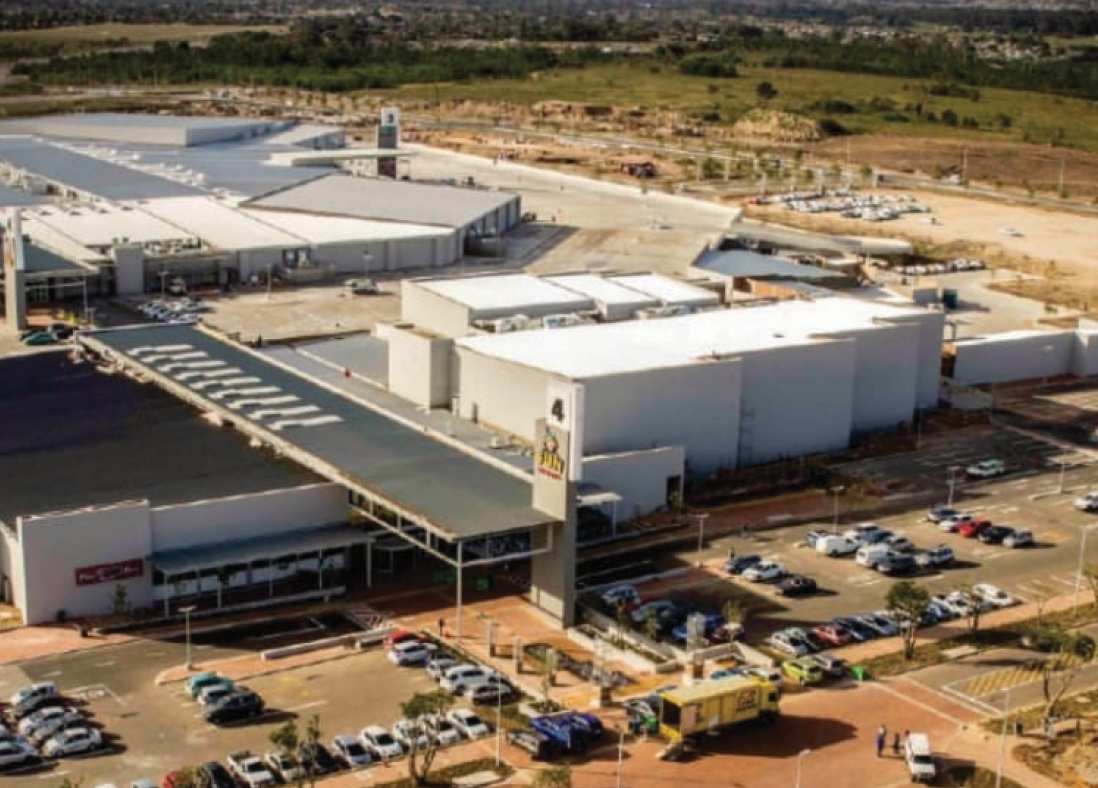 The Executive Director of Human Settlements in the Nelson Mandela Bay metro, Tabiso Mfeya, says the construction of houses will lead to the construction of a planned private hospital; schools; large-scale retail, commercial, and office facilities; and light industrial zones and warehousing.
The Executive Director of Human Settlements in the Nelson Mandela Bay metro, Tabiso Mfeya, says the construction of houses will lead to the construction of a planned private hospital; schools; large-scale retail, commercial, and office facilities; and light industrial zones and warehousing.
He says the housing being built will include subsidised mixed housing and State-funded housing.
The project is delivering jobs and ensuring that the SMMEs in the municipality benefit, says Mfeya.
Incorrect credit profile? The Credit Ombud can help
Incorrect credit profile? The Credit Ombud can help LondekileHelp is on hand for people who have incorrect information registered about them at credit bureaus for outstanding debt, and are unable to buy things on credit or get a loan as a result.
The Credit Ombud assists consumers with credit information disputes.
"For example, when consumers have been incorrectly listed at a credit bureau or concerning non-bank credit agreements, such as a garnishee order (when money is taken directly off your salary before you are paid)," says Kabelo Teme, the Credit Ombud's Communications Liaison Officer.
She explains that if someone has a complaint about a credit provider, or incorrect information reflects on their credit profile at a credit bureau, they must first try to resolve the matter with the credit provider or credit bureau directly.

Credit bureaus have 20 business days to investigate the complaint.
"If they have not provided written feedback that they have credible information and can't amend the credit profile, consumers can complain with the Credit Ombud.
"It's important that consumers keep a record of the names of the people they spoke to, and the reference number provided to them by the credit bureau," says Teme.
The Credit Ombud can't accept a complaint if the reference number is older than six months.
"In this case, the consumer has to start the process with the credit bureau from the beginning," Teme explains.
Lodge a complaint
Everyone is entitled to a free credit profile from a credit bureau every 12 months.
"Consumers must check their credit profile to see if all information is correct. If there are any errors, the consumer must contact the credit bureau to fix them," says Teme.
Consumers can complain with the Credit Ombud by calling 0861 662 837 or 011 781 6431, sending an SMS to 44786, or emailing ombud@creditombud.org.za.
Once the complaint has been received, the Credit Ombud may ask for more information or documents. It will then contact the credit provider or bureau and allow them to respond. When the investigation is complete, all parties are notified of the outcome.
"The consumer also does not have to accept the Credit Ombud's outcome. If they are still not happy, they can contact the National Credit Regulator, National Consumer Tribunal, or a lawyer," says Teme.
The major credit bureaus are:
- TransUnion: 0861 886 466. Log a dispute at www.transunion.co.za.
- Experian/CompuScan: 0861 514 131. Log a dispute at mycreditcheck.co.za.
- XDS: 0860 937 000. Log a dispute at www.splendi.co.za.
- VeriCred: 0871503601 or www.vccb.co.za.
- TPN - 0861 876 000 or www.tpn.co.za.
Kick the habit and take up sport instead
Kick the habit and take up sport instead LondekileThe South African Police Service (SAPS) is looking at alternative and interactive ways to tackle substance abuse among youth.
This is according to SAPS Section Commander for Substance Abuse Programmes Refilwe Matlamela.
Matlamela was speaking at a webinar facilitated by the Justice, Crime Prevention, and Security Cluster to introduce the roll-out of substance abuse prevention awareness campaign by SAPS, Department of Social Development (DSD), Department of Justice and Constitutional Development (DOJ&CD) and Government Communication and Information System.
Matlamela said youngsters need to be inspired to make healthier choices and mentioned the Sport is your Gang South Africa (SIYGSA) tournament.
“SIYGSA forms part of an international programme targeting children and youths from challenging backgrounds, encouraging them to take up sports. Through this programme, we want to bring people affected by substance abuse together by engaging them in integrated dialogues and sporting activities.”
Sport promotes positive self-development and a healthy lifestyle, both of which result in strong young people who are less likely to join a gang or become involved in criminal activity.
The programme is a joint effort between SAPS National Head Office, Division: Visible Policing and Operations and the University of Pretoria: Department of Family Medicine – Community-oriented Substance Use Programme (COSUP). It was first introduced as part of the National Drug Master Plan 2019–2024.
“As part of our extensive research on the development of the programme, we found that activities such as soccer, netball, virtual and performing arts, obstacle courses, and community dialogues were the most preferred. Once that was established, DOJ&CD led and funded community dialogues on substance abuse as part of the build-up activities towards the SAPS and COSUP-led sports tournament,” explained Matlamela.
Matlamela said the pilot project was hosted at the LC de Villiers sports grounds at the University of Pretoria, with the second event hosted at Club Sport Maritimo, also in Tshwane.
“We anticipate that the first provincial pilot will be in KwaZulu-Natal in celebration of Youth Month in June.”
Matlamela ended her discussion by encouraging citizens to treat people who are battling substance abuse with respect and dignity.
“We need to stop calling them names and rather try and create an inclusive environment for them,” she said.
To report drug-related activity, call the police at 10111. To find a substance abuse treatment centre near you, call the DSD at 012 312 7500.
Live theatre is back
Live theatre is back LondekileTheatre patrons tired of having to watch productions online due to Coronavirus Disease restrictions are in for a treat with live audiences able to attend the 2022 Kucheza Afrika Festival at the South African State Theatre (SAST) from 1 to 10 April.
“The offering boasts some of the top choreographers and dancers our country has produced. It promises the best and I cannot wait to experience this with our patrons and dance community,” says SAST Artistic Director Aubrey Sekhabi.
An action-packed festival Gregory Maqoma’s KETIMA and Luyanda Sidiya’s UMNIKELO pair in a double bill to launch the festival on 1 April. Sidiya will showcase his trilogy, including SIVA and AMAWETHU, which close the festival on 10 April.
Dance maestro Vincent Mantsoe headlines with a premiere of KOMA, in a double bill with long-time industry friend David April, who salutes him with a reimagination of Mantsoe’s acclaimed BARENA on 2 and 3 April.
Thami Tshabalala’s ISINYUSO is set for 5 and 6 April; international act Helge Letonje takes centre stage with DIGGING on 7 and 8 April; and Kristi-Leigh Gresse, the 2021 Standard Bank Young Artist Award winner, recreates ENCRYPTION on 8 and 9 April. Bailey Snyman’s critically acclaimed GASLANDS also features on 8 and 9 April.
New open programme
A new category, Open Programme, has been included in this year’s festival for professional and young artists looking for a platform to create and present their work.
Sbonelo Mchunu explores the life of a loner subjected to confusion, self-destruction and self-loss with INTERNAL on 2 and 3 April; while Phumlani Ndebele’s THIRST, an exploration of the reaches of physicality and the capacity of the human form, features on 7 and 8 April.
Kucheza’s Young Artists programme, a bespoke platform for young choreographers, features Teresa Phuti Mojela, presenting NGWEDI on 9 and 10 April, a tribute to the late dancer and choreographer Themba Mbuli; Julia Burnham showcases KNOTS & CODES on 5 and 6 April; and Muzi Shili presents KONTROLLER.
Get tickets
Tickets can be purchased at the SAST or Pick n Pay, or online at webtickets.co.za. Prices range from R80 to R150.
Mending the economy
Mending the economy vuyelwanWhile there is no single remedy to rid the country of its challenges, South Africa remains a good place to inject investment.
“South Africa is open for business on many different fronts; we have very good infrastructure, a good financial system and good human capital and talent pool to draw from,” notes Group Senior Executive for Strategic Trade at Aspen Pharmacare, Dr Stavros Nicolaou.
Nicolaou’s comments were in relation to the fourth edition of the South African Investment Conference (SAIC), which was on 24 March at the Sandton Convention Centre in Johannesburg.
In April 2018, President Cyril Ramaphosa announced that South Africa would host an investment conference with the aim of raising R1.2 trillion over a five-year period.
Since its initial launch in 2018, the SAIC has drawn delegates from South Africa and the world. The conference, which was held annually until 2020, showcased investment opportunities available in the country.
The fourth SAIC which was meant to be held in November last year, was postponed due to a number of reasons including that the country would have a far greater Coronavirus Disease (COVID-19) vaccination coverage, making travelling and gathering easier.
Since the start of the conference, South Africa has attracted R770 billion in commitments across a wide range of economic sectors.
Aspen was among the list of companies that raised their hands in the drive to attract investment to the southernmost country on the continent. 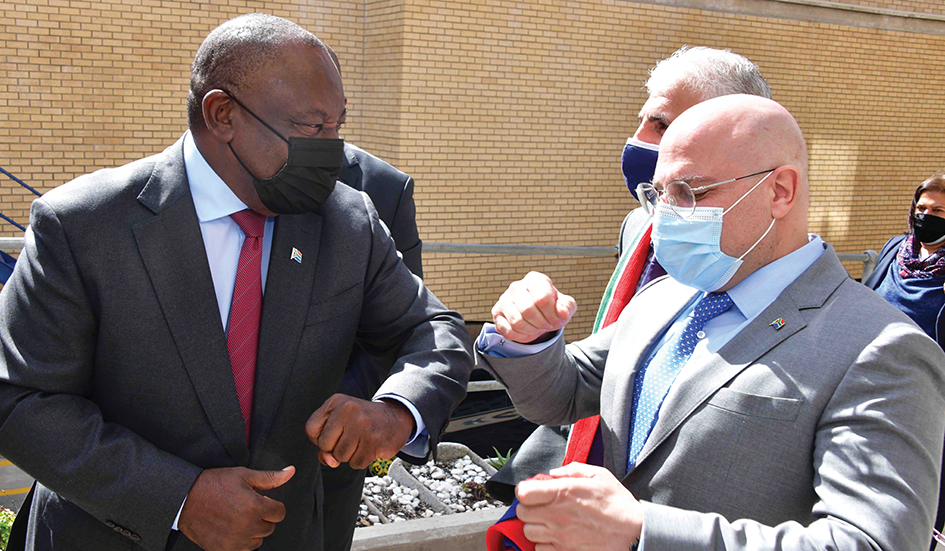
The pharmaceutical company pledged to invest R3.4 billion at the inaugural conference in 2018 and to date, the full investment has been realised.
“That investment means our South African facility in Gqeberha, that we made a pledge for, is now one [of], if not the world’s largest, manufacturer and supplier of general anaesthetics. It is also the first site for the production of the COVID-19 vaccine on the African continent,” Nicolaou says in an interview with Government Communication and Information System (GCIS).
The local company, which has been operating for over two decades, has a presence in over 50 countries with its flagship manufacturing assets based in Gqeberha in the Eastern Cape.
The sterile facility contains state-of-the-art pharmaceutical equipment and systems used to manufacture advanced sterile medicines, including vaccines. The company has played a role in responding to pandemics such as HIV and AIDS, multi-drug resistant TB and most recently, COVID-19.
In the early onset of the COVID-19 pandemic, Aspen was a significant supplier - both domestically and in other parts of the world like Europe - of general anaesthetics and muscle relaxants needed to ventilate patients.
The company was also the first African country to produce the COVID-19 vaccine under contract manufacturing for Johnson & Johnson (J&J), the majority of which have gone into African arms. Aspen has produced close to 180 million vaccine doses.
Putting food on the table
The company, which also has manufacturing operations in East London as well as a chemicals facility in Cape Town, employs around 3 000 people at its manufacturing operations.
In a country facing high levels of unemployment, Aspen’s investment has helped many to put food on the table.
“The investment we pledged in 2018 has produced over 200 new jobs and these are highly skilled, high-tech jobs with a significant leaning towards an export orientation and, of course, our country needs exports.”
He adds that the work force at the plant in Gqeberha has mainly been drawn from New Brighton and other nearby areas.
Looking to the future
In keeping up with an ever-changing world, innovation is a critical aspect to growth for any company or economy and the company recently demonstrated this when it received the licensing rights for the J&J vaccine.
The agreement means that Aspen can now package, sell, as well as distribute J&J’s COVID-19 vaccines under its own brand.
“We will now have our own vaccine in Africa called Aspenovax, made in Gqeberha for South Africans [and] the African continent. We will not have a dependence on COVID-19 vaccines externally. We now have our own production base in South Africa. We will make sure that Africans are not left at the back end of the queue when COVID-19 vaccines are required,” he says.
Nicolaou urges investors to take the plunge and invest in South Africa.
“South Africans are generally hard working people, so if you make an investment in South Africa, I think you will be rewarded,” he says. – SAnews.gov.za
New investments prepare ground for jobs, growth
New investments prepare ground for jobs, growth vuyelwanSouth Africa has already reached 95% of the five-year R1.2 trillion investment target set by President Cyril Ramaphosa four years ago to bolster economic growth and stimulate employment.
President Ramaphosa confirmed this recently, at the 4th SA Investment Conference (SAIC), which reaffirmed SA as an attractive business, investment and tourism destination.
The conference secured a further 80 investment pledges, valued at R332 billion.
“With the pledges we have received today – and with cancellations and additions we have heard about from investors in previous conferences – we have now taken the total level of investment pledged at the four investment conferences to R1.14 trillion,” the President said.
“This means we are now only R60 billion short of our target. I expect that by next year we will not just reach our target – we will exceed it,” he added.
New investment commitments
The SAIC commitments are impressive, not only in value, but also in the diversity of projects they represent, the President said.
Commitments were made by companies from South Africa, Belgium, Canada, China, Czech Republic, Finland, France, Germany, Ireland, Mauritius, Norway, Pakistan, Sweden, Turkey, United Arab Emirates, United States and the United Kingdom.
The African Development Bank pledged R42.5 billion over the next five years, to support public and private sector investments in the priority areas of agriculture, renewable energy, transport, youth employment, health and vaccines manufacturing, among others.
“We know South Africa is bankable,” said African Development Bank Group President Dr Akinwumi Adesina.
South African Breweries pledged a further R920 million into its Prospecton and Ibhayi breweries, ramping up its total commitment to R4.5 billion. 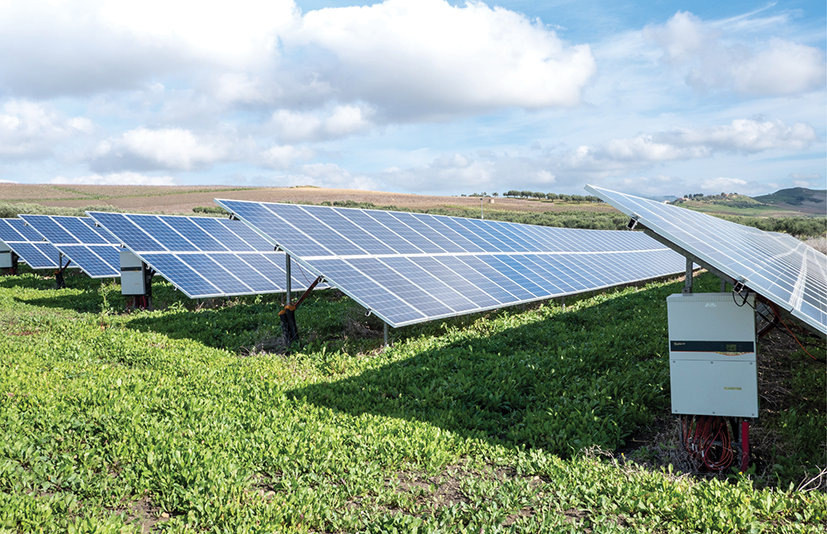
“These investments will give us the capacity to not only contribute to the economy, but also to be able to contribute to job creation, tax, excise and procurement spend,” said SAB CEO Richard Rivett-Carnac.
President Ramaphosa said commitments were made for renewable energy projects, and plants based in SA will build some of the components to be used in these projects. “From biogas to solar, from wind to battery storage, these investments are at the cutting edge of one of the most important growth industries in SA.”
Other investments will breathe new life into mining. “Through these investments, we will be expanding our production of platinum group metals and other minerals that are vital to the emerging technologies of the future,” the President confirmed.
Several investments were also made in metal fabrication and steel, vanadium, aluminium and other manufacturing plants. “These contribute to our ongoing effort to add value to the minerals that we mine and to create jobs that would otherwise have gone to more industrialised countries.”
Other investments include those to produce vaccines and other pharmaceuticals, both for SA and the continent; film, design and other creative industries; infrastructure and logistics; property and telecommunications; agriculture and the digital economy.
Progress to date
Despite the impact of COVID-19, R774 billion in investment commitments had been raised by the 3rd SAIC in 2020. Of this, around R316 billion has been invested, President Ramaphosa said.
He confirmed that of the 152 investment pledges, 45 projects have been completed; 57 are under construction; and 15 have been put on hold.
The investments that have been realised since the first conference have created job opportunities, increased localisation and expanded local value chains. They have brought skills, technology and know-how into our economy, said President Ramaphosa.
“Whether it is a young person employed in a data centre, a worker at an auto plant, or a small business supplier to a renewable energy plant, these investments are changing people’s lives. The chance to earn a decent livelihood is fundamental to the dignity and worth of every human being, and it is these investments that are making the difference,” the President said.
He added that the SAIC has provided a glimpse into SA’s economy of the future – an economy that is rich, diverse and growing.
“Your investments are making a difference in local economies and in people’s lives… We are forging ahead to transform our economy, to unlock our country’s potential and to create meaningful livelihoods for all our people,” the President said.
Nonceba gives lifeline to abused women
Nonceba gives lifeline to abused women UrsulaA mother of three has been able to leave her abusive husband and start a career, thanks to help from the Nonceba Family Counselling Centre.
Ntombizamantungwa Nyembezi (33) says the centre gave shelter and care to her and her children, now aged 14, 11 and nine, for eight months in 2016. 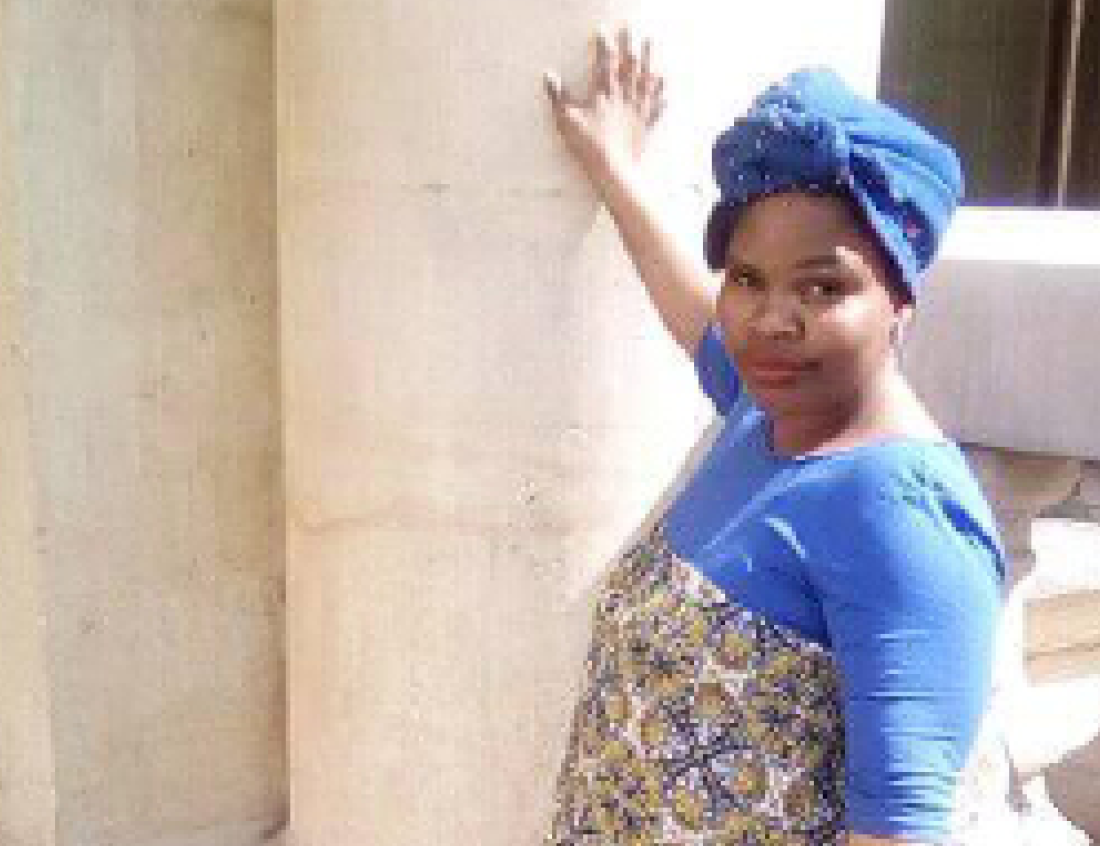
Nyembezi had been living in an abusive marriage with her breadwinner husband in Khayelitsha in Cape Town. She says after years of abuse and wanting to keep her children safe, she made the decision to leave – but because of her limited resources, she did not know where to start.
“I met a social worker from another organisation that offered counselling to kids at my children’s school. That social worker organised shelter for me at Nonceba,” Nyembezi says.
She received emotional and psychological counselling at the centre, and was equipped with computer literacy and general skills training that enabled her to stand on her own feet, she says. She was also helped to find a job.
When her ex-husband pressured her to go home, she was able to say no because she could support herself and her children.
“My ex-husband tried on several occasions to contact me, but I had managed to break free with the help of Nonceba,” she says.
Giving women a fresh start
The Nonceba Family Counselling Centre is a non-profit organisation that offers shelter, counselling and skills development to survivors of abuse in and around Cape Town. It can accommodate 21 adults and their children.
“We also have a residential safe house for abused or ‘at-risk’ children,” says manager Nozuko Conjwa, a social worker who specialises in working with children who are traumatised.
“Nonceba provides services that help end gender-based violence in our communities,” says Conjwa.
She says their counselling services are aimed at ensuring that victims are given the support they need so they are not forced to go back to their abusers.
The centre also offers child victim support services, which provide assistance, intervention and counselling for children under the age of 14 who have been sexually or physically abused. Education programmes are run to make children safer by teaching them – and the community – about abuse, how it can happen, how to prevent it, and how to deal with it should it happen.
“Courses are also given on parenting skills, health education, nutrition and first aid. This work is done in our training facility, in schools, public halls, churches and via local radio.”
President concludes North West Imbizo on a high note
President concludes North West Imbizo on a high note LondekilePresident Cyril Ramaphosa has described his Presidential Imbizo in the North West province as a success after holding a fruitful session with community members.
The imbizo was held recently in Mmabatho Stadium in the Ngaka Modiri Molema District Municipality where scores of residents had gathered.
President Ramaphosa interacted with people and listened to their experiences of daily life in the province, service delivery challenges as well as their initiatives and solutions to improve socio-economic conditions.
The President was flanked by a number of his Cabinet Ministers, including Minister of Transport Fikile Mbalula, Cooperative Governance and Traditional Affairs Minister Nkosazana Dlamini Zuma, Employment and Labour Minister Thulas Nxesi, Minister in the Presidency Mondli Gungubele, Minister of Tourism Lindiwe Sisulu, Social Development Minister Lindiwe Zulu and Mineral Resources and Energy Gwede Mantashe, among others.
The President told the community members that he had heard their cries and that government will be focusing more on service delivery.
“We had a very fruitful session with the community … the residents were able to raise their concerns and complaints but they also put suggestions forward, and what we need to do better, so I found it very enriching.
“We are going to be focusing more and more on service delivery. Many of the issues that were raised were of a service delivery nature, there was so much enthusiasm that nearly all of them wanted to speak,” the President said.
President Ramaphosa said it had been great to hear people speaking openly and freely as this is what enriches democracy.
The Imbizo also provided an opportunity to inspire new thinking, different ideas, and suggestions on how to fix the challenges that exist.
“I am grateful that the Ministers were present and were able to respond to many of the issues that have been raised.”
He said the District Development Model was moving into top gear. “We are going to be utilising it more and more so that as the government we stop working in silos, we must work together in an integrated way.
“I am very pleased that most of the replies that were given here are a clear demonstration that we are now becoming more and more integrated and we are going to address the challenges that our people have faced.”
The President told the community members that government will focus more on service delivery and the Ministers would return to the area with a number of programmes focusing on what needs to be done.–
SAnews.gov.za
SAIC: Over a trillion in investments
SAIC: Over a trillion in investments UrsulaThe recent 4th South African Investment Conference (SAIC) secured significant investments to boost the economy, create jobs and improve lives and livelihoods. 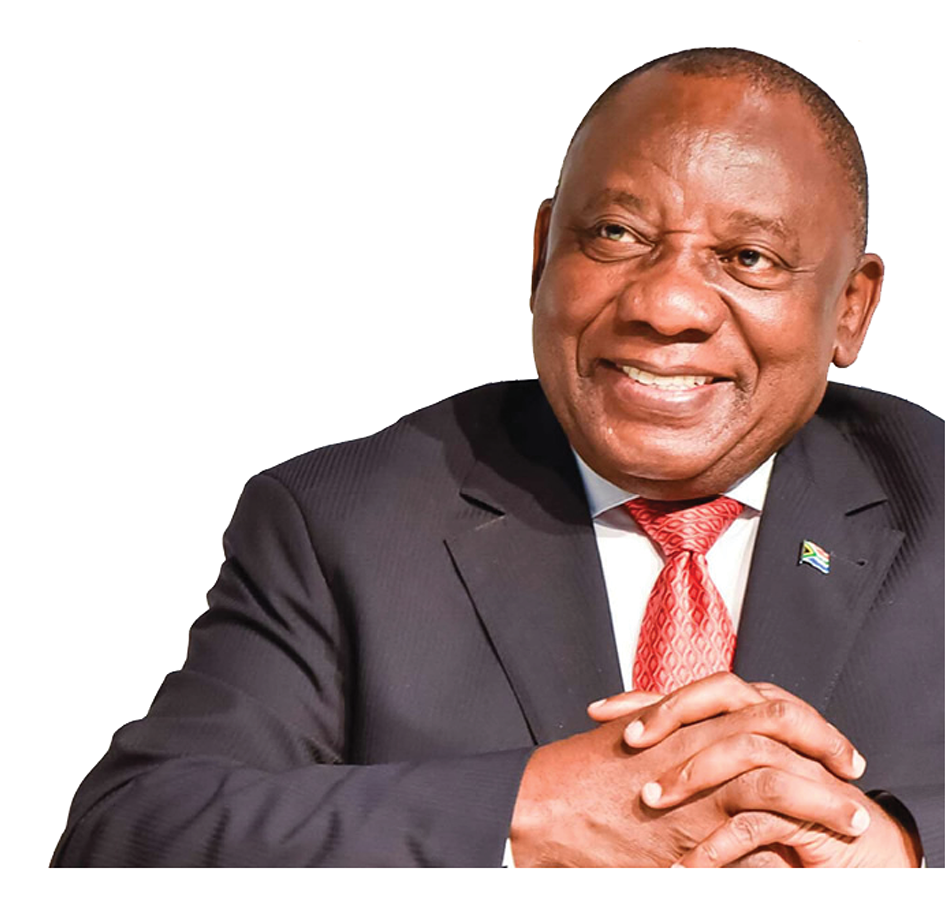
Here are the highlights in numbers.
Five-year target overview
R1.2 trillion: The target President Cyril Ramaphosa put in place in 2018, to raise via the SAIC over five years.
95%: The percentage of the total R1.2 trillion target that was achieved by the end of the 4th SAIC.
80: The number of new investment pledges made at the 4th SAIC.
R332 billion: The value of the 80 new investment pledges made at the SAIC in March.
R1.14 trillion: Total investments pledged since 2018.
R60 billion: The amount still needed to meet the R1.2 trillion target.
Progress up to the 4th SAIC
R774 billion: Investment pledges made before the 4th SAIC, which accounted for 64% of President Ramaphosa’s R1.2 trillion five-year target.
R426 billion: The amount needed to meet the R1.2 trillion target before the 4th SAIC.
152: The combined investment pledges made over the first three years.
45: The number of projects that have been completed; or, where it involves new machinery or equipment, these have been procured and installed; or production has started.
57: The number of projects under construction.
15: The number of projects put on hold, largely to due to COVID-19.
New pledges March 2022
Energy sector
R3 billion: African Rainbow Energy
R463 million: Bio2Watt
R437 million: Seraphim
R16 billion: Scatec
R30 million: Polarium
Automotive sector
R16.4 billion: Ford
R550 million: Africa Auto Group
R800 million: BMW
R190 million: Daimler
R102 million: Formex
R180 million: Wheel Assemblers
R1.8 billion: Tshwane Automotive Special Economic Zone
R350 million: Volkswagen
R10 billion: The amount Mercedes-Benz pledged at the SAIC launch to invest on factory upgrades at three of its local facilities. This investment has enabled the automotive manufacturer to build its new C-Class model, which is now being exported to over 100 countries.
Mineral beneficiation sector
R11 billion: African Rainbow Minerals
R10 billion: Anglo American
R11.8 billion: Implats
R140 million: Isondo
R2.8 billion: Ivanhoe Mines
R9.4 billion: Sedibelo
R14 billion: Renergen
R497 million: African Rainbow Capital
Healthcare and pharmaceutical sector
R2.5 billion: Biovac
R500 million: Aspen
R150 million: Cipla
R255 million: Pfizer
R226 million: BT Industrial Group
R20 million: IMT
R3 billion: Nant SA
R484 million: Siemens
R652 million: Afrigen
Creative industries and fashion sector
R350 million: Warner Media
R929 million: Netflix
R650 million: PFN
R390 million: Compagnie Mauricienne De Textile LTEE
R7.5 billion: Videovision Entertainment
Infrastructure, property and logistics sector
R2.2 billion: DSV
R18 billion: Waterfall
R2.1 billion: Imperial
R2 billion: Collins
R7 billion: Telkom
R6.2 billion: Cato Ridge Logistics Hub Consortium
Food and beverages sector
R400 million: RCL Foods
R2 billion: Equator
R170 million: Lotus
R500 million: ECP Private Equity
R4.5 billion: SAB
Development finance institutions
R21.7 billion: New Development Bank
R42.5 billion: African Development Bank
R3.3 billion: Meridiam
R2.25 billion: Norfund
Mobile and paper
R50 billion: The amount Vodacom committed to invest in fixed and mobile networks over the five-year period. The telecoms giant has already invested R47 billion of this pledge.
R7 billion: Paper and packaging manufacturer SAPPI has spent this amount expanding its pulp production capacity to almost 900 000 tonnes per year at its Saiccor Mill in KwaZulu-Natal.
Special Tribunal is showing that crime does not pay
Special Tribunal is showing that crime does not pay vuyelwanFrom the Union Buildings
During the recent Presidential Imbizo in Mahikeng, several citizens raised concerns about the pace of the fight against corruption. They told me what I have heard in many other communities across the country: that the perpetrators of such acts are known, not least because they flaunt the proceeds of their crimes.
But the arm of the law is long. Those who have stolen from the state may believe they have gotten away with it. But their deeds will eventually catch up with them, whoever they are, and whatever position they may hold.
They will learn that crime does not pay.
In this regard, one of our most effective weapons in the fight against corruption and state capture is the Special Tribunal of the Special Investigating Unit (SIU), which I established in 2019.
It adjudicates on matters that the SIU institutes for civil litigation after it has concluded its investigations. The Special Tribunal was set up to speed up litigation. This approach has made it possible for public funds and state assets lost to corrupt acts to be recovered faster, avoiding delays in the high courts, where the SIU has to wait its turn together with other litigants.
The SIU can request preservation orders and the freezing of assets to prevent further losses to the State. This is important when considering that perpetrators who are under suspicion often go to great lengths to move around, hide or dispose of proceeds of corruption.
There can be no doubt the Special Tribunal has been a game changer. Since its establishment, the Tribunal has recovered around R8.6 billion from unlawful contracts. 
For any fight against corruption to be deemed effective, it is not sufficient that perpetrators are prosecuted. The proceeds of their crimes must be recovered. This money belongs to citizens and should be used to meet their needs.
The Special Tribunal recently ordered two construction companies to return the profits they earned from R40 million in contracts to erect the Beit Bridge border fence. This followed an investigation by the SIU that uncovered a number of irregularities, including a pre-payment to the companies by the Department of Public Works and Infrastructure.
Over the past few weeks alone, the Tribunal has reviewed and set aside more than R100 million worth of irregular and unlawful contracts arising from COVID-related procurement.
The Special Tribunal has also been successful in getting back money from senior executives in state-owned enterprises who conducted irregular business activities. For example, last year a former Transnet executive was ordered to pay R26 million he received as a shareholder of a firm of consulting engineers contracted to Transnet while he was a full-time employee.
The SIU has in a number of cases approached the Tribunal to delay the payment of pension benefits, pending the outcome of its investigations, to public servants implicated in financial irregularities or fruitless and wasteful expenditure.
The cases before the Special Tribunal show that much work still needs to be done to strengthen governance and management across all arms of the state. They point to serious lapses on the part of accounting officers and failures to adhere to laws and regulations governing procurement
I have said before that winning the war on corruption will be difficult, and that it will take time to unravel the vast webs of patronage that had become entrenched.
I have also maintained that we must fight private sector corruption with equal vigour, because for every public sector employee willing to be bribed, there is a business person willing to pay a bribe.
These corrupt relationships have eroded the capacity of the state to deliver on its mandate. They have set back the state’s efforts to provide decent healthcare, to deliver clean water, and to ensure a consistent supply of power to communities and businesses.
But, as the Special Tribunal has demonstrated, we are steadily turning the tide. Not only are perpetrators being arrested and taken to court; they are also having to forfeit the proceeds of their crimes.
There is still a long way to go, and there is a huge amount of stolen public funds that still need to be recovered. But the SIU and the Special Tribunal have made a good start, and I am confident of many more successes in the months and years ahead.
Start-up company helps keep the lights on
Start-up company helps keep the lights on UrsulaA start-up engineering company is helping to keep the lights on in South Africa. 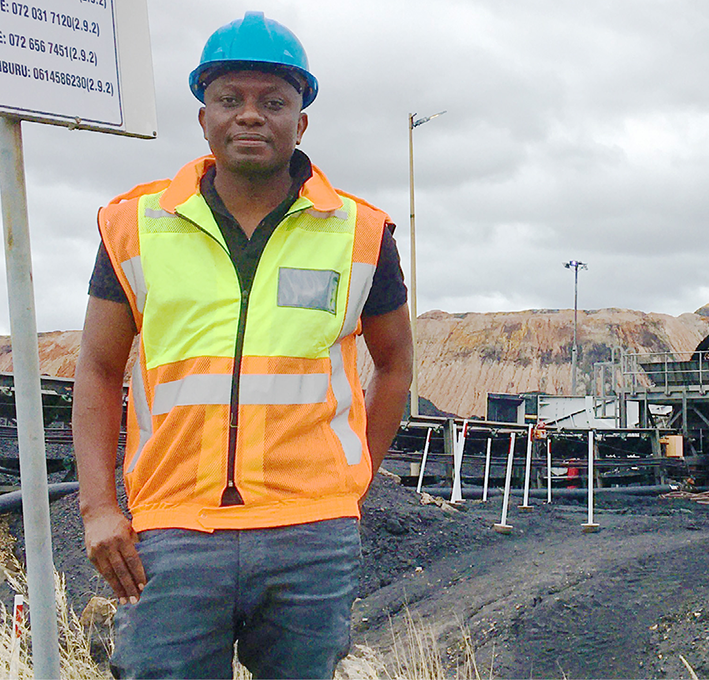
Phaphanyi Trading delivers coal from the Grootegeluk Coal Mine in Lephalale, Limpopo, to Eskom’s Matimba and Medupi coal-fired power stations.
Exxaro, which owns the mine, gave Phaphanyi an R18-million interest-free start-up loan through its Enterprise Supplier Development Programme. This enabled Phaphanyi to start operating in July 2021 – and to create 36 jobs.
“The money helped with buying the equipment we needed for carrying the coal. It has also helped us pay the salaries of employees in the company,” says Phaphanyi Director Moijang Mpherwane.
“We supply coal to Eskom’s power stations through our conveyor belts, which are linked to both Exxaro and Eskom’s conveyor belt system,” says Mpherwane.
Community involvement
Apart from empowering small businesses in its area of operation, Exxaro funded the building of a community clinic which, among other things, assists workers who are injured on duty and serves as a COVID-19 vaccination and testing site for both employees and members of the public.
To date, 3 500 residents of Lephalale and 88% of employees have been vaccinated at the walk-in clinic.
“We have signed an agreement with the Department of Health in Limpopo that will see the clinic being used as a distribution centre for chronic medication,” says Exxaro Group Manager for Health and Safety Joseph Matjila.
The clinic is one of many ways the mining company is working alongside government to improve people’s lives. Exxaro demonstrated its commitment to South Africa and its people when, in 2018, it made a R20-billion investment pledge at the South Africa Investment Conference (SAIC) convened by President Cyril Ramaphosa. Of this, R17 billion has already been spent.
Exxaro Executive Head of Projects and Technology Johan Meyer says the pledge has seen the company employ more people and support small, micro and medium enterprises.
Meyer says 56% of jobs that were created were filled from within Mpumalanga and Limpopo.
“Exxaro has directly created 6 812 jobs via investments in projects that indirectly impact 70 000 people,” he says.
The SAIC is a government initiative aimed at showcasing the investment opportunities that are available for business in South Africa.
This year’s conference took place on Thursday, 24 March, at the Sandton Convention Centre.
UIF death benefits
UIF death benefits LondekileDid you know that spouses, life partners and children can claim benefits from the Unemployment Insurance Fund (UIF) following the death of a contributor?
According to the UIF, qualifying workers are people who worked for more than 24 hours per month and contributed 1% of their monthly remuneration to the UIF. Their employer must have contributed another 1%.
A spouse or life partner has the first right to claim a death benefit from the UIF within 18 months of a worker’s death, says the UIF. Dependent children can only claim if there is no spouse or life partner, or if the spouse or life partner has not claimed the benefit within 18 months of the death. They must apply within 14 days of the 18 months and prove that they were still dependent on the deceased at the time of his/her death.
Beneficiaries
Sylvia Mokonyane (50) of Lotus Gardens in Pretoria lost her daughter in May 2021. She says her daughter was the breadwinner at home and the family depended on her financially.
Mokonyane was able to apply for the dependant’s benefit at her local labour centre.
“Friends advised me to visit our labour centre to apply for the dependant’s benefit following my daughter’s death as she was my sole provider. I found that I qualified for the benefit as my daughter was a UIF contributor who had worked for many years.”
She adds that even though the application process was challenging at times, she managed to receive a once-off payment from the UIF, following her successful application.
What is needed to apply
- 13-digit barcoded/smart card ID, passport, or asylum seeker permit of the applying dependent.
- Death certificate (issued by the Department of Home Affairs) of the deceased contributor.
- For spouse: Marriage certificate.
- For partner: Lobola letter or an affidavit proving your relationship.
- For children: In the case of a guardian, proof of guardianship, a letter confirming that the minor is still in school, and a birth certificate.
- Proof of schooling is required for dependents between 21 and 25 years.
The department encourages applicants to physically visit their nearest labour centre with the relevant documents to apply.
Find your nearest Labour Centre on www.labour.gov.za or contact the UIF at 0800 030 007.
Unemployed LAP up chance to secure jobs
Unemployed LAP up chance to secure jobs UrsulaSouth Africa’s economy is being boosted by an annual Department of Employment and Labour programme that provides skills to the unemployed youth and unemployed Unemployment Insurance Fund (UIF) beneficiaries. 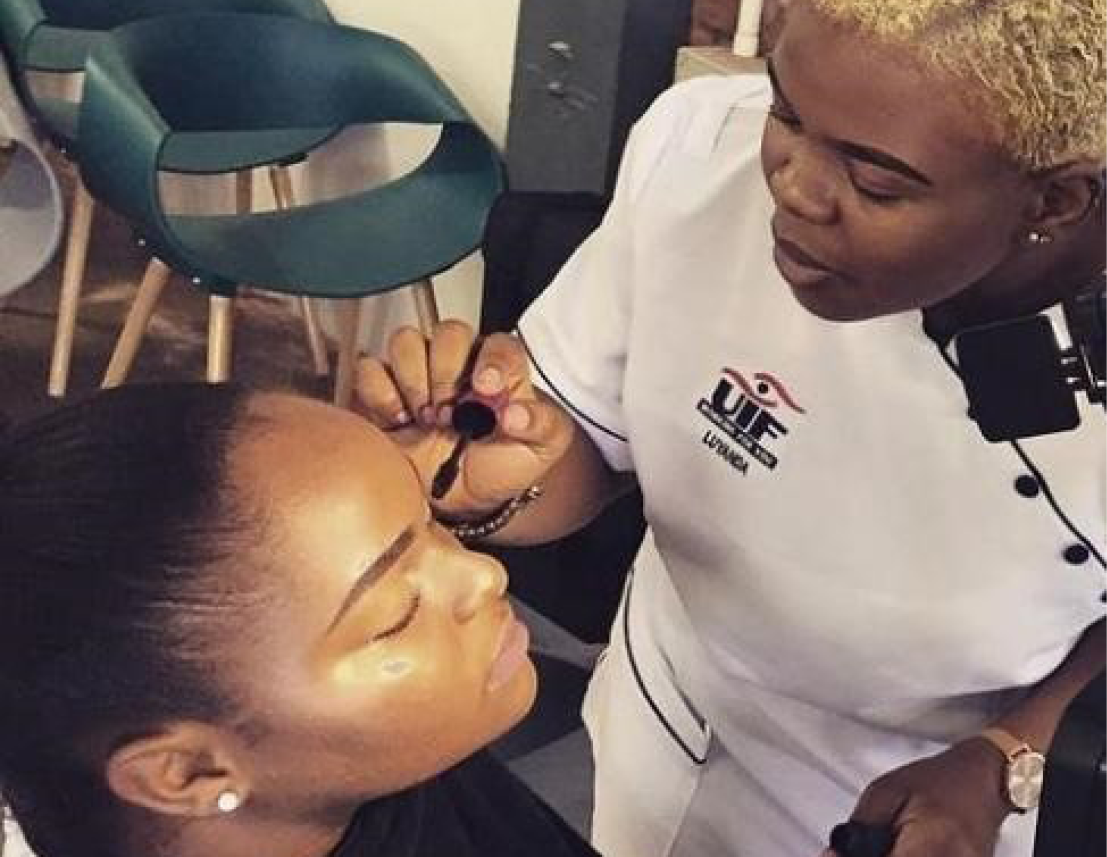
The Labour Activation Programmes (LAP), funded by the UIF, help prepare youngsters to enter the job market and to establish their own businesses.
The UIF has set aside R551 million to train 14 771 beneficiaries as chief food handlers and 150 as fibre optic technicians. A further 5 000 people will be taught enterprise development skills for mixed farming.
Of the beneficiaries, 70% are former UIF contributors who lost their jobs, says Minister of Labour and Employment Thulas Nxesi.
Nxesi says government is making every effort to create employment in South Africa. “We urge the private sector and all potential stakeholders to partner with us to reduce and end unemployment in the country because partnerships are key to creating jobs,” he says.
Beautician nails the job
Luyanda Luthuli (28), a 2019 LAP beneficiary from Empangeni in KwaZulu-Natal, now works as a professional beautician.
“LAP helped me get a job in the beauty industry, which is something I have always been passionate about. I learnt how to administer anti-ageing IV drips and to do microblading and pedicures, among other things,” Luthuli says.
She says that in addition to her job at the salon, she offers nail and beauty treatments part-time. She hopes to use the business skills she learnt through the LAP to develop her own business.
Another beneficiary of the programme, Bayanda Zaca, has gone from working odd jobs in construction to being a head chef at a top restaurant in Durban.
“I am also helping the new trainees at the food processing centre in Ndwedwe,” says Zaca.
Doors of opportunity
Beneficiaries are recruited through the Department of Employment and Labour’s Employment Services of South Africa (Essa) portal. Unemployed people
register on the portal and are contacted should opportunities arise.
To improve the programme, the UIF has forged a partnership with the Fuze Institute for Humanitarian Praxis.
This organisation is responsible for appointing applicants who will be part of the LAP programme.
Speaking at the launch of this year’s programme, Fuze CEO Thandi Ngcobo revealed that 14 771 beneficiaries have been employed by the Department of Education in KwaZulu-Natal after completing their training.
She says the Department of Economic Development, Tourism and Environmental Affairs in KwaZulu-Natal has pledged to support the 5 000 learners’ co-operatives by purchasing their farming produce, while Link Africa has committed to employing the 150 fibre optic technicians upon completion of their training.
Virtual classrooms innovative and modern
Virtual classrooms innovative and modern UrsulaBasic Education Minister Angie Motshekga says the Vodacom Virtual Classroom innovation allows the country to have all learning resources in one fit-for-purpose portal designed by experts, with the interest of learners and teachers in mind.
Minister Motshekga was speaking at the handover ceremony of Vodacom's Virtual Classroom solution held in Midrand.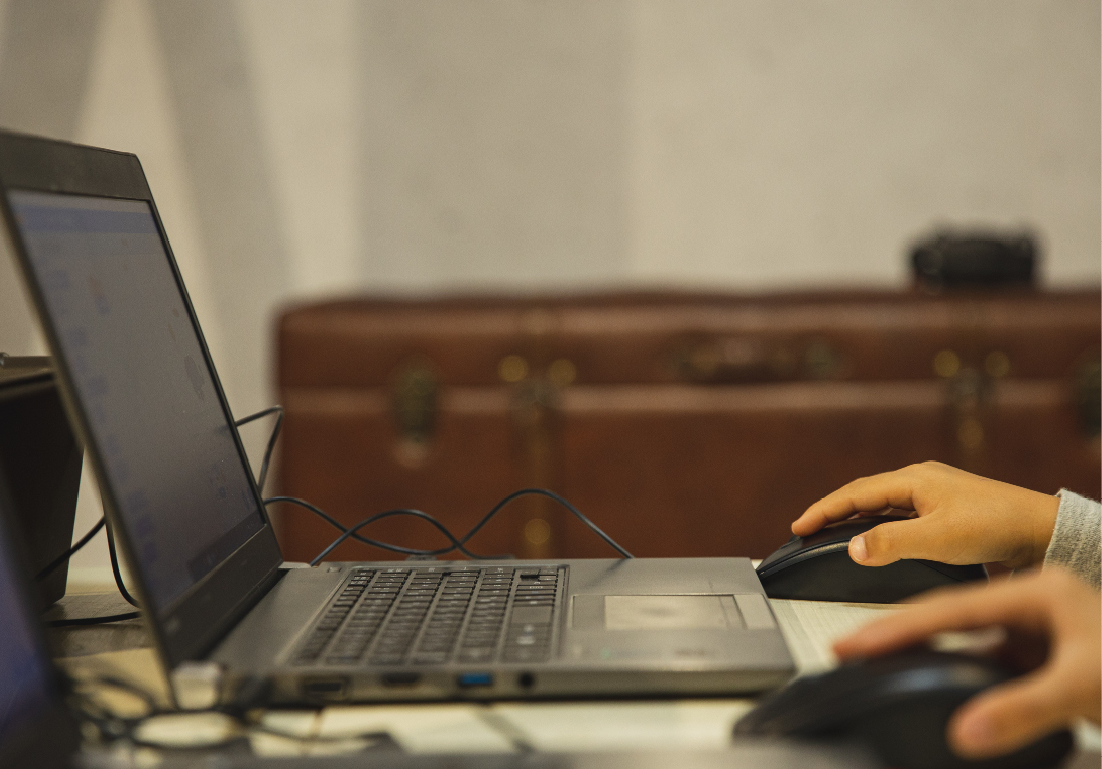
This forms part of the Coronavirus Disease (COVID-19) Disaster regulations imposed by the Independent Communications Authority of South Africa (ICASA) to support online learning and ease congestion on the country’s telecommunication network.
The Minister said that government and ICASA agreed that all mobile network operators must establish a virtual classroom solution to support virtual learning and teaching during COVID-19 induced intermittent school closures.
She said that it was pleasing to note that Vodacom has complied with the ICASA regulations without external pressure.
Minister Motshekga has lauded the virtual classroom solution as innovative and modern.
“This clearly indicates that Vodacom takes corporate citizenship more than seriously, beyond compliance issues. The investment made by Vodacom in public schooling today has the ripple effect of benefiting the next generation of learners and teachers,” she said.
The Minister said the country must learn not to spend its children’s inheritance; but invest to benefit the next generation.
“In the main, the virtual classroom will make a difference to teachers and learners in selected schools by improving connectivity and making gadgets accessible, thus enhancing computing skills and appreciation of the power of information communication technologies (ICTs),” she said.
The Minister emphasised that ICT professional development for teachers is important for the success of this project.
She added that this solution will improve the learning process by providing more interactive educational materials that increase learner motivation and facilitate the easy acquisition of basic skills in various subjects.
“We are slowly beginning to narrow the great digital divide in the public schooling sector, which warms my heart,” she said.
The Minister said that the Vodacom Virtual Classroom complements the department’s first-of-its-kind online programme dubbed: The Comprehension Across the Curriculum, which was recently launched to turbocharge reading for meaning.
Minister Motshekga reported that the department has finalised a plan to deploy digital learning and teaching support materials (LTSM) through ICTs at all levels of the basic education sector since 2019.
“At the heart of basic education, reforms are imperative to eliminate the digital divide by ensuring that all schools and education offices access the internet and data within six years,” she said.
The Minister said that education, skills development and jobs are vital national imperatives to unlock economic growth and sustain livelihoods. – SAnews.gov.za
